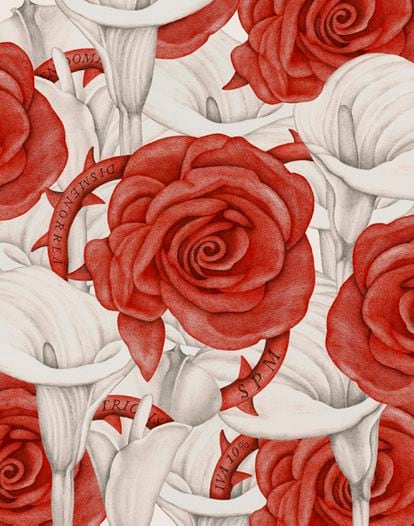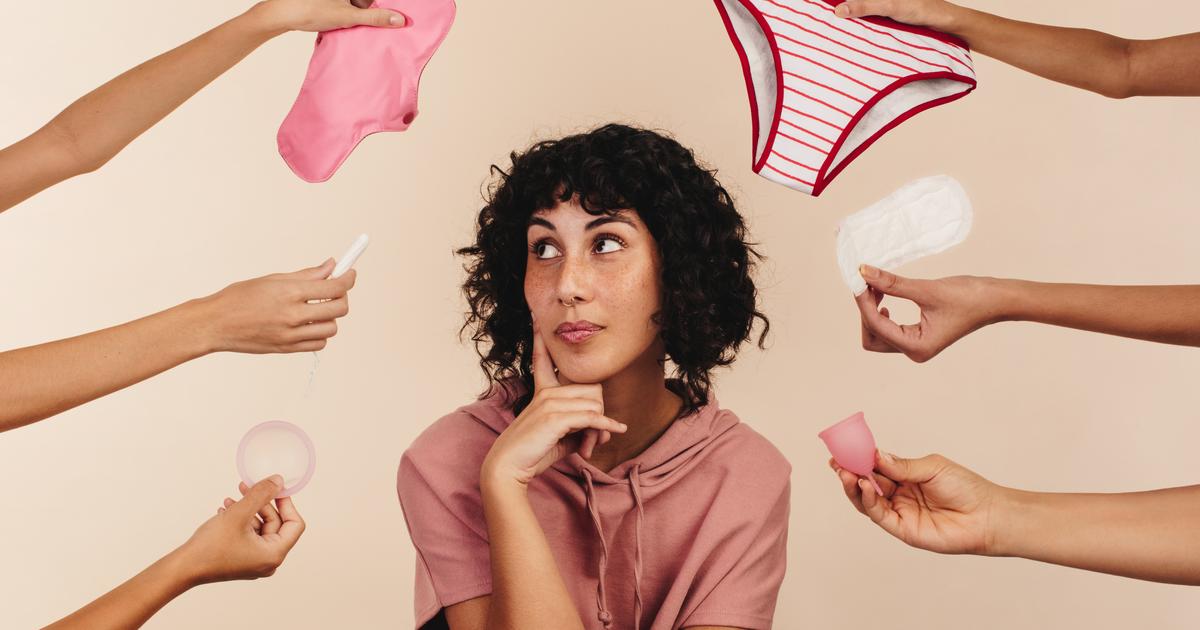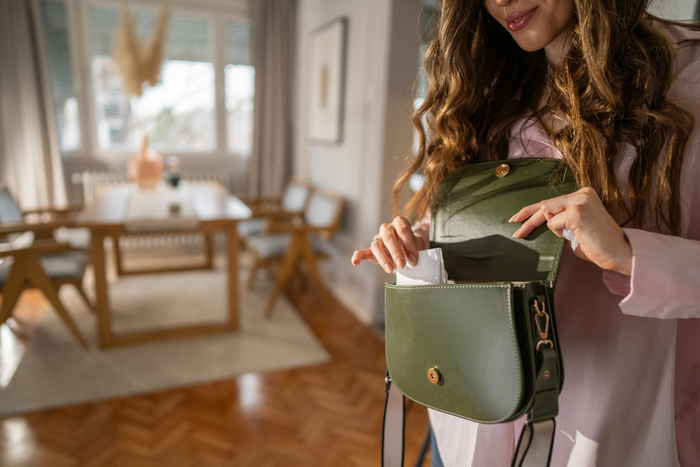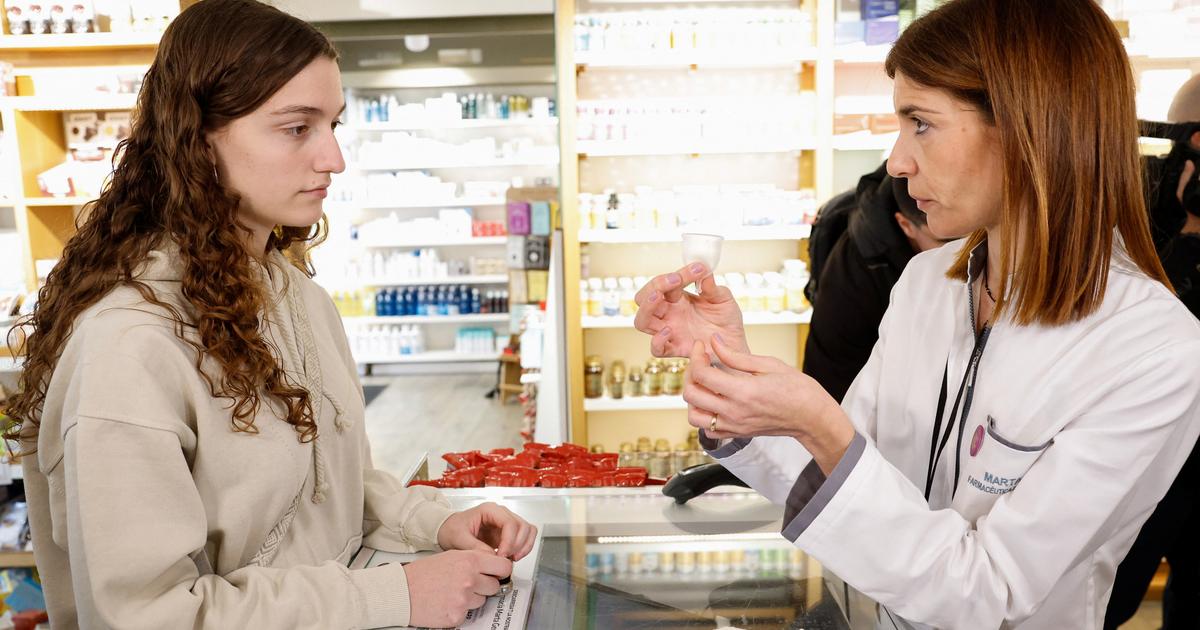The computer screen reads: “Menstrual Workshop”.
It's 6:30 p.m. on a Tuesday in December.
Yaiza Cristóbal, a 28-year-old architect, has just finished her workday.
He connects from home to this Zoom meeting organized for free by the Madrid City Council.
The attendees open their cameras and Ifara, María, Noelia appear… They are all between their twenties and thirties.
They do not know each other and this will be the first time they hear their voices: “I am here because I have started using the menstrual cup and it has changed my life.
I want to know more about sustainable menstruation”, says Noelia.
“I have been diagnosed with endometriosis.
It has taken years and I had not even heard of this disease.
I have felt uninformed and helpless”, Ifara whispers.
It's Yaiza's turn: "My first day of period I bleed a lot,
This apparently natural act for them, to talk openly about their rule with strangers, would have been unthinkable a few decades ago. “Back then, all kinds of euphemisms were used to not even name it,” recalls Alicia Botello, an anthropologist at the University of Seville and author of the book
¡Llegó la Regla! An anthropological and gender analysis of menstruation in Spain
. "I'm indisposed, the red army is coming, I'm sick and a long etcetera." For centuries menstruation has been silenced and rejected. Women have experienced their bleeding and pain behind closed doors, out of shame and ignorance. But that is changing rapidly. The new generations have access to information that has never existed before. A walk through the different social networks is enough to find menstrual disclosure accounts managed by gynecologists, endocrinologists, psychologists, journalists and even menstrual activists —who defend the rule as a motor of social and political change—, such as the pedagogue Erika Irusta. "For the first time this flow of information is massive, accessible and multidisciplinary",celebrates the founder in 2010 of one of the first educational communities on the world's menstrual cycle, Soy1Soy4. The conversation of menstruation is becoming naturalized in bars, social networks and Parliaments. In 2021, also for the first time, it has been considered a "public health problem", and its rights, "human rights", according to the prestigious medical journal
The Lancet
.
And with the pandemic, the menstrual and hormonal disorders that hundreds of thousands of women in the world manifested in the hard months of confinement and the changes in their cycles —two periods in one month, significant delays…— after passing the disease and after the vaccination have promoted this paradigm shift also in the field of science, which until now has not devoted much effort to studying the cycle and has ignored it in most of its research.
“We are not equal to men and we will never be”, says Carme Valls, endocrinologist and author of the book
Invisible Women for Medicine on the other end of the phone.
(Captain Swing), who has dedicated his career to claiming the need to address medicine with a gender perspective. He explains in his book how historically science and medicine have taken the masculine as a reference to the human without taking into consideration that physiological and hormonal events such as the menstrual cycle are very relevant differentiating factors when analyzing certain diseases, their symptoms or the effects of a medication. “In the 19th century, for example, it was discovered that most polluting products are endocrine disruptors, and this can alter menstruation. With all the problems of environmental pollution, every day there are more women with menstrual disorders. If there had been more studies on the cycle, we would possibly know more about this relationship today.”This lack of research in the past also generates a lack of knowledge among health personnel and information towards patients. In her opinion, the problem is that gynecologists know about menstruation what they have been told in their specialty, but there is no specific training on menstruation in universities. “The training is good, but perhaps it is true that since the pill no more research has been done... Partly because it is about reaching practical and useful knowledge and the pill for certain cases is really a solution, although not for everything . There are other solutions as well”, says Javier Castrillo, head of gynecology at the Verín Hospital (Ourense), who has noticed a radical and “very positive” change in consultations,where the shame of 20 years ago has disappeared ("before, many women came as if having their period was something bad") and people speak "more freely and naturally" about symptoms, sensations and all kinds of details. “The key is to investigate”, concludes Valls. "Because, if there is a lack of science, who is going to train women?"
Catalan illustrator Cristina Daura, 33, defines herself as a grumpy person who enjoys all the good things that life has to offer. Of this illustration for menstruation she says: “It is the emotional tsunami that appears inside me every month. I never know how strong it will be, but I am learning to live with its impacts”. Cristina Daura
And the multidisciplinary confluence that is taking place today is wonderful because there is no other way to approach it.
The rule is a physiological, social, cultural, even political fact.
Artists who paint with their menstrual blood, from Argentina's Juliaro to Italy's N'drame; film directors like Lena Dunham who speak unfiltered about her endometriosis and her operation to remove her uterus; books that break taboo, demystify centuries-old beliefs or promote debate... In 2019 the menstruation emoji was created - a somewhat controversial drop of blood because it could represent many things and, above all, because the original design was censored: panties with blood —. And this year Erika Irusta has just finished a pedagogical guide for the CSIC entitled
How to claim menstruation
that gives teachers of schools and institutes tools to explain everything necessary to boys and girls. In addition to the aforementioned accounts on networks and courses such as the one Yaiza attends that Tuesday.
“Do you know what your menstrual blood is like: color, texture…? Do you know what it contains? Water, lipids, proteins, dead and stem cells, hormone remains, contaminants…”. Paloma Alma, the workshop speaker, talks for two hours about everything that menstruating implies. Founder of Escuela Cyclo, the private company from which she usually gives workshops on menstruation —with prices ranging from 25 to 250 euros, depending on the type of course—, she talks that afternoon about the endometrium, the inner layer of the uterus that hormonal action thickens each month to receive the fetus and, if pregnancy does not occur, most of that nutritional magma is discarded. "That's the rule." Explains what diseases such as endometriosis consist of —when the endometrium grows in areas outside the uterus, such as the fallopian tubes or the ovaries—,It affects between 10% and 20% of women of childbearing age. And he gives a practical class on sustainable menstrual hygiene material, from cloth pads to cups, which he also sells on his website.
Madrid-based illustrator Carmen García Huerta, included in Taschen's 100 Illustrators compilation, suffers from chronic anemia caused by her period.
Of his drawing, he says: “The prickly rosettes are quite literal.
I think that mother nature went from baroque designing this system to ensure human reproduction.”Carmen García Huerta
"I don't know if young women are more reconciled with our menstruation, but we have more chances of being because there are more tools at our fingertips," acknowledges Marta Bofill (24 years old) by video call.
This journalist is, together with her colleague Laia Flórez (28), founder of
Acontrarregla, the podcast that you download every 28 days
. “The more you discover about the rule and the more you are pulling the thread, the more it fascinates you. Get hooked!” laughs Flórez, who understood years ago that there was a barrier between her and her gynecologist. “When I told him that I had unbearable nausea, he told me that there were four symptoms associated with the period, and that nausea was not one of them. With that he settled the matter. And you don't say anything at that moment, but you think: that the one who has the period every month is me! And I know what my body feels. That was how Yaiza began looking for answers on the internet. The three agree that, despite the fact that their mothers did speak to them naturally about the period, they did not know what menstruating really meant in this society and they felt alone. Up to now.
The psychologist specialized in menstrual therapy, Lola Hernández, talks about a worldwide movement of reconciliation with the body that has been expanding for a few years thanks to pioneering initiatives such as the Soy1Soy4 community in Irusta or her own itinerant project, La Caravana Roja, from where she offers support and information. “I have accompanied women who when they understand the origin of their pain, it disappears. There are others who will be accompanied by pain, but it changes the way they live with it. And I approach this from my condition as a psychologist and psychotherapist”, she exposes. And he adds: “Many women do not get a diagnosis or have normalized their pain. That is why it is so important to learn to listen to our body and what it is trying to tell us through the symptoms. So when the medical staff tells me this is normal,I recognize the doctor as a professional, but I also recognize myself as an expert in my own body”. This security is what Yaiza has gained since she began to find out about the rule. And the reason why she has been able to find all this information is the work undertaken by women a generation or two earlier, such as Erika Irusta, Xusa Sanz, a nurse specializing in hormonal changes and the author of
The menstruation revolution
(MR), or Carme Valls.
premenstrual syndrome [recognized since 2019 in the WHO catalog of diseases as premenstrual dysphoric disorder and that causes from headache, constipation or diarrhea to fatigue or irritability 14 days after the first day of menstruation].
It is related to an imbalance in estrogen and progesterone.”
However, when Valls wanted to investigate it 20 years ago, he was denied the scholarship.
"They told me it was not a relevant issue."
That more than 1,800 million women bleed each month for an average of 40-45 years, suffer mood swings and pain, sometimes incapacitating for certain activities,
Chilean artist Cecilia Vicuña began painting her menstruation at the age of 17.
“It was sacred for centuries and became despised and hated with the arrival of machismo and patriarchy.
For me it was pure beauty, and painting it was my rebellion.”
In the image, his work 'Angel of menstruation' (1973). Cecilia Vicuña
As early as the 1970s, second-wave feminist artists and activists put menstruation at the center of the struggle with images like Judy Chicago's first photolithograph, titled
Red Flag
(red flag, in English), which showed in the foreground her hand removing a bloody tampon from her vagina. In 1977 the Society For Menstrual Cycle Research was born, where women from all over the world and from all disciplines share knowledge even today. But women in those years continued to experience their bleeding and pain behind closed doors. So, the goal was to show that this physiological event that had been used for centuries to marginalize women did not differentiate them from men in terms of productivity. “Hide menstruation and silence our body as a strategy to conquer power”, in the words of Irusta. That movement achieved the academic and labor incorporation of women,but it was also the fuse that exploded the boom of the medication to relieve pain and the pill to stop menstruation. And although more and more gynecologists are paying attention to these issues, that medical practice is still very established. “Menstruation itself is not painful and women can lead a very normal life with it. 39% have alterations”, explains Carme Valls. “Reducing that percentage should be the main goal of the medical community in terms of menstrual research. But instead we use birth control to treat the pain, and that's just a patch," he continues. Yaiza was prescribed the pill and the symptoms stopped. “Faced with such relief, you think it's over. But when after a while I stopped taking it, everything went back to the way it was before,” he laments."What you have to do is delve into what is the cause of that pain to try to solve the problem," summarizes Valls.
"Looking back over the years, I realize that without this phase of hiding and medicalizing, the following generations would not have been able to study at universities and work," Erika Irusta acknowledges today. "And possibly I would not have had the tools to develop my thinking." It was the work of the Boston Women's Collective, in the United States, and Carme Valls, in Spain, that led her to investigate more about her body, her cycle, and how culture had made her reject and reject it. "You think you're crazy because there are days you feel emotionally out of control, but then you discover that it's not really like that, that it's a normal biological and physiological process that we just haven't been explained or taught to accept."
Author of
Diary of a body
and
I menstruate. a manifesto
But when Irusta began to speak in these terms, a decade ago, only a handful of women claimed that path of acceptance and reconciliation with menstruation.
Now that the democratization of the internet has created a new way of communicating, it seems that her work and that of her predecessors is leaving behind.
“I was more of thought and those young women are more of action.
Executors of change”.
In April 2015, an image went around the world: the American drummer Kiran Gandhi — then 26 years old — with her blood-soaked pants crossing the finish line at the London Marathon.
She decided to run without using sanitary material that would retain her menstruation, which is known as
free bleeding
(bleeding free, in English). She wanted to denounce that in many countries like hers [she is of Indian origin] using hygienic products is not a choice, since only 12% of women have access to them. Period poverty, according to Unicef, not only encompasses that lack of access to items, but also adequate facilities to wash during the period. 20% of Spanish women suffer from this situation according to the NGO Period Spain. The 10% VAT assigned to these products – the same as caviar, for example – makes them luxury items for those living below the poverty line. The proposal to reduce this VAT to 4% of essential products was considered in the 2018 and 2019 Budgets - the Government calculated the impact of this measure on public coffers at 18 million euros -,but it did not go ahead and the current Budgets do not contemplate it. With the covid, however, it was considered from the first moment that the masks were of first necessity. "The pandemic has shown how issues that only affect women are underestimated," Irusta denounces.
Born in Milan, Anna Parini started working as an illustrator in Barcelona 10 years ago.
This drawing is inspired by a song that she used to listen to a lot as a teenager: “Björk sang “I'm a fountain of blood in the shape of a girl”. Anna Parini
This claim of feminism has taken the rule to the Parliaments. In Spain, the Basque Country has been the first to approve a regional initiative that urges the regional government to prepare a study on menstrual poverty in the territory and to implement the pertinent measures to eradicate it. Scotland was a pioneer in the world in 2020 with a law that establishes the free distribution of hygienic protections in public establishments. New Zealand approved last March to distribute them in schools, and in December France did the same, but in universities. The measure, in the opinion of Carme Valls, "generates a bias towards non-university students."
The policy has raised, until now with great controversy, sick leave on the days that women have their period. In Japan it has existed since the middle of the 20th century, although the taboo and stigma in the country remain. Italy proposed it in 2017 for those with endometriosis or other menstrual illnesses, but it did not go ahead. The division, then and now, is between those who believe that these concessions can stop their hiring and those who believe that the measure finally accepts men and women with their differences. The productivity argument is poor and biased, as Paloma Alma criticizes: "The low productivity of women on their period days is analyzed, but their high productivity on ovulation days is hardly studied, for example."
In this boiling context where menstruation is claimed from the social, cultural, scientific, political and economic levels, Irusta thinks of her more than 10,000 female students: “A lot of work has been done to think that there is no menstrual revolution.
Of course there is!”
But just as what worked in the 1970s doesn't work now, what we stand for today may not work for menstruating people in the future.
For the anthropologist Alicia Botello, we must break with the myth of basing the essence of women on menstruation.
“With menarche [first period] it was considered that the girl became a woman.
This relationship between menstruation and women would leave out those women who do not menstruate because they have menopause, suffer from amenorrhea, etc.
Therefore, if we understand that being a woman goes beyond menstruation,
having menstruation does not necessarily make you a woman.
There are transsexual people, for example, and they can be men who menstruate or women who do not."
Irusta recalls: “Our menstrual experience as women was written by men.
And when we saw that it did not correspond to our reality, we thought that we were the ones who were wrong.
Now that women are taking ownership of their cycle and rewriting the way they relate to it, she is clear: “If we don't create spaces to learn about those other experiences, we will do with those menstruating people what they did with us.
To care for and act respecting all experiences, we need all bodies and all voices.”
Sign in to continue reading
Just by having an account you can read this article, it's free
RegisterLogin
Thanks for reading THE COUNTRY




/cloudfront-eu-central-1.images.arcpublishing.com/prisa/QZBKEHFL6RHI5FSPQNNBZGIIUA.jpg)
/cloudfront-eu-central-1.images.arcpublishing.com/prisa/4XEFCJJ6OBGEVN2626XOLJD47Y.jpg)









